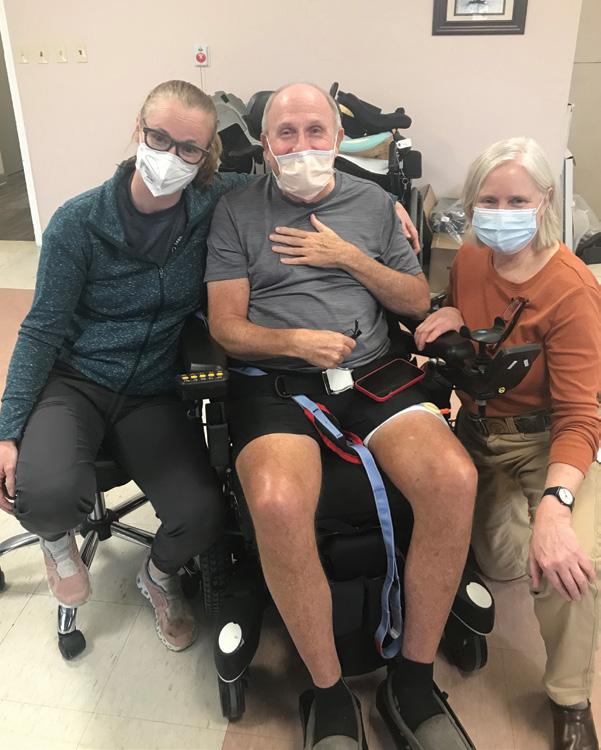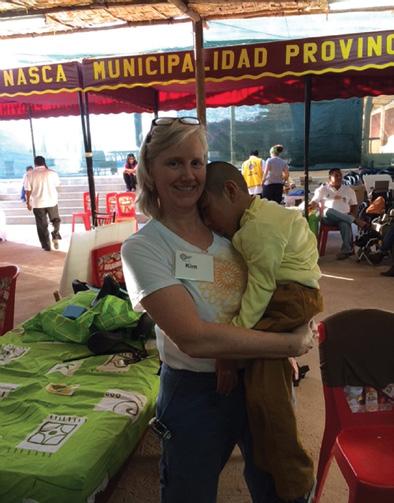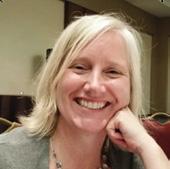
7 minute read
CLINICALLY SPEAKING
KIM DAVIS RETURNS TO CLINICAL ROOTS, FINDS JOY AT THE BOSTON HOME
Written by: DOUG HENSLEY
Advertisement
For the first time, Kim Davis finds herself in something of a new world, which is somewhat of a surprise considering the depth of experience she possesses.
In 2019, she returned to her clinical roots and went to work at The Boston Home as an assistive technology specialist and works a schedule that has her immersed in the lives of the residents for whom she cares.
“This setting is the first time I’ve had the opportunity to practically live with the people I serve,” she said. “To be here for 10- to 12-hour days and have these residents roll down the hall, knock on the office door with their footplate and say, ‘The thing you did yesterday is really helping’ is very different from my previous outpatient or communitybased settings, where feedback can be delayed by weeks.”
Her current role has her focusing on seating and wheeled mobility, interface pressure mapping, 24-hour postural care and supporting the wound care team. The days are busy, demanding and professionally fulfilling.
“Here, you know if you’ve helped someone right away (or not),” she said.
Davis’ schedule calls for her to work 32 hours over three days. She can typically be found in one of three places: The Boston Home caring for residents, her own home in New Hampshire or at the home of her 91-year-old mother in Maine. “I am tired quite a bit,” she said.

Corinne Curran, Assistive Technology Coordinator; Brian – resident of TBH and me. (Pic after Brian completed a multi-day evaluation process for a new power wheelchair and then posing in his top pick after trials in several models)
As a result, when she’s working, she stays a few blocks away and can be back and forth quickly, which is a good thing.
“It is never boring,” she said. “Whatever we have planned for the day usually goes to Plan B, C or D on a regular basis. Whenever you’re dealing with people, priorities change quickly. For instance, if a wheelchair breaks, you move that to the front of the line and address it as a priority. This job teaches flexibility, which is a good life skill.”
Davis has a diverse background that includes research, participation in RESNA and international standards committees, and serving as clinical rehab manager for the northeast sales team at Sunrise Medical. She holds two bachelor’s degrees from the University of Maine (zoology and German) and a master’s in physical therapy from Arcadia University. At The Boston Home, she is part of a specialty long-term care facility team that serves individuals with advanced multiple sclerosis and other progressive neurological diagnoses.
“I’ve been a physical therapist since 1988,” she said. “My brother’s death at age 57 after a battle with multiple myeloma is what triggered me to return to the clinical setting. Near the end he told me never really got to carry out what he wanted to do when he grew up. I didn’t want to find myself in the same position. “I enjoy the opportunity to use my skill set and decades of experience to directly impact the quality of people’s lives. That’s more than enough to get me going every day. This is also a great environment to apply the golden rule every minute of every day.”
The facility where Davis works, The Boston Home, is located in the suburb of Dorchester. It was founded in 1881 and serves adults with advanced multiple sclerosis and other similar disorders. The facility has been nationally recognized for the caliber of care it provides and it is the only one of its kind in New England, according to its website.
No wonder Davis is so excited to be a part of the team.
“I just have immense appreciation for the folks who are managing these significant diagnoses,” she said of the facility’s residents. “Just being able to help improve their independence and function, to improve their comfort and their ability to interact with one another in daily activities is extremely satisfying.”

Child is his first ever wheelchair (Eleanore’s Project trip in May 2015)

Child with his mother: his typical mode of transport (Eleanore’s Project trip in May 2015)

Kim holding child: showing carry-over of postural asymmetry. (Eleanore’s Project trip in May 2015)
Of course, it wasn’t long after she began work at The Boston Home that the COVID-19 pandemic took hold, altering life for everyone to some degree but especially residents and staff at long-term facilities. Some protocols such as a mask mandate remain in place today.
“I had worked here for less than six months before the pandemic hit,” she recalled. “I don’t really know what this facility is like in full ‘normal’ mode. During the pandemic there was a lot of ‘all hands on deck’ situations, and the entire rehab team shifted focus to assisting with direct care, such as helping with feeding, transfers, anything that was needed as more of an essential level of care.”
Early in her physical therapy career, she preferred neurology over orthopedics and pretty quickly gravitated to wheelchairs.
Even though her professional life keeps her plenty busy, Davis also has had time to get involved in Eleanore’s Project, and recently joined their board. She has traveled to Peru six times with the team, led by co-founder Tamara Kittelson. It’s just a place where you can go for two weeks and do little miracles over and over again,” she said. “I have great appreciation for what they do as far as rebuilding second-hand wheelchairs, and everyone I have ever known who has participated in it (or similar organizations), wants to go back a second time. You simply get to apply your skill set and not have to worry about the headaches of what you have to do here to do business.”
Eleanore’s Project is focused on supporting the quality of life for children with disabilities and their families, according to its website. Once a year, the organization sends a shipment of wheelchairs to Lima, Peru, and follows up with a two-week wheelchair clinic on the ground in Peru.
For Davis, The Boston Home is a perfect fit.
“I was recruited here by Faith Savage, PT, to gradually assume the wheelchair duties as she eases toward retirement. Faith has worked here for over 25 years. Together with the assistive technology team, she has done phenomenal work to preserve residents’ independent mobility, including multiple technology iterations responding to disease progression. Initially we were sharing resident and out-patient caseloads, but with pandemic guidelines, it made more sense to transition to a clearer division of labor, with Faith manning the out-patient clinic and my primary responsibility became the residents.
“I will be forever grateful to Faith for recruiting me, and I consider it an honor to try to carry on in her footsteps. It may be no accident that she selected me, as we have some similarity in our work styles — we are both pretty wed to being precise and thorough with our evaluation process. I arrived at TBH with a 25-year nickname of Millimeter Kim (dubbed by Gerry Dickerson) and although it was originally a light-hearted jab, I wear it like a badge of honor. I am so thankful I get to do this work. I just have tremendous appreciation and respect for all of the great people I’ve met in this profession — colleagues as well as wheelchair users.”
CONTACT
Kim may be reached at KDAVIS@THEBOSTONHOME.ORG

Kim Davis, PT, MSPT, ATP, has been specializing in seating and wheeled mobility for over 30 years. Her work history includes a full spectrum of clinical roles, from seating and physiotherapy clinics to research and taking a role of a wheelchair manufacturer’s clinical liaison. She has been involved in RESNA and ISO committees work focusing on wheelchair standards. Davis is currently practicing at The Boston Home, which specializes in care for people with multiple sclerosis and other progressive neurological conditions. She is also an avid volunteer in Eleanore’s Project as a member of the clinical team providing and setting up wheelchairs in Peru.




